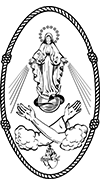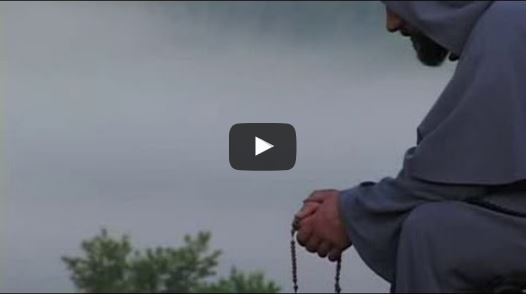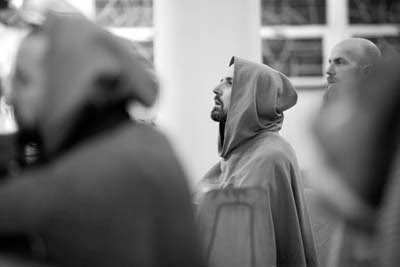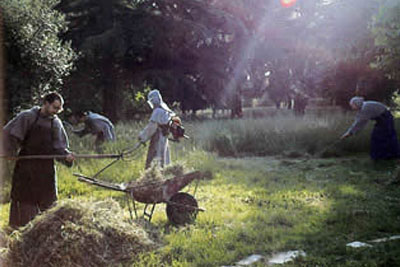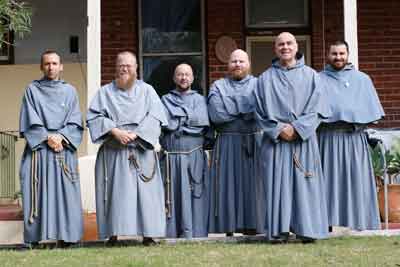Our Life of Prayer
“Pray Always to God with a pure heart” – Rule Ch. 10“Pray Always to God with a pure heart” – Rule Ch. 10
Our Seraphic Father St. Francis commands us in the Holy Rule to “pray always with a pure heart to God” (CHAPTER X). Everything about our life gives evidence that the life of prayer ranks first in importance, according to the teaching and example of our Blessed Father Francis and St. Maximilian Mary. In every friary of ours there must be a chapel with the Blessed Sacrament — truly the center of affection for the whole place, as for every consecrated heart. If possible, it is even to be located at the physical center of the friary, in a recollected and silent area, to facilitate the friar’s visits to the most Holy Sacrament. In every friary an enclosure is established, comprising as much of the space and as many of the rooms as possible. No one may enter this enclosure, or cloister, except for some objective reason and with express permission, so that silence may be safeguarded and recollection preserved in almost all of the friary. The community excludes with all promptness everything that brings into the brotherhood the noise, the distraction, the dissipation, and the spirit of the world – radio, television, profane literature, etc. – and during the time and places of greatest activity, efforts increase to preserve the high place of contemplation by means of interior recollection and continued silence, in obedience to the precept of our Holy Father St. Francis expressed in Chapter V of the Rule: “Let them labor faithfully and devoutly in such a way that they will not come to the point of extinguishing the spirit of prayer and devotion, to which all temporal things must yield.” The friars rise early and pray the night office (Office of Readings) long before dawn in order to express our resolve to praise the Lord even by night, and to begin each day in a personal contact with Him. Holy Mass and the entire Liturgy of the Hours, mental prayer and Eucharistic adoration, spiritual reading and the Rosary are practiced faithfully every day according to the horarium set for the community. Thus each day begins and then is spent entirely animated by an unceasing spirit of prayer: “pray without ceasing” (1 THESS. 5:17).
“Our friaries are true houses of Prayer in which silence and recollection reign, in which there is an atmosphere of prayer and contemplation.”
In our life of prayer we look to and faithfully strive to imitate the Blessed Virgin Mary who “pondered all these things in Her heart” (LK. 2:51), especially in Her humble and hard- working life at Nazareth, where we reflect on Her being “full of grace” (LK. 1:35) and where She lived in the profound and loving intimacy with Jesus. Our friaries are true Houses of Prayer in which silence and recollection reign, in which there is an atmosphere of prayer and contemplation. And on the face of each friar, recollected and modest, there is always the gentle grace and steady light of the Virgin in prayer. Our Seraphic Father Saint Francis declared that he wanted to follow “the life of poverty of our most high Lord Jesus Christ and His most holy Mother,” and commanded his sons and to do the same. This is why in Chapter VI of the Holy Rule for the friars (the Regula Bullata) he wrote that his brothers should “not appropriate anything to themselves, neither house, nor place, nor anything,” but rather should be “as pilgrims in this world, serving the Lord in poverty and humility, confidently begging alms.” We are permitted nothing of our own, therefore, neither in private nor in common, neither in desire nor in actuality, neither internally nor externally. Why? Because Our Lord Jesus Christ and His most holy Mother chose poverty. This is the “sublime height of exalted poverty” which is the most distinguishing characteristic of Franciscan life, and the only jealously guarded possession of the Order of Friars Minor! We, the sons of the Poverello (THE “LITTLE POOR MAN”) of Assisi, in imitation of him, ought to be fit witnesses of the poverty of Jesus and His Mother. Pope Paul VI, in a discourse to the Franciscan Order given on July 12, 1966, asked, “Which virtue should chiefly distinguish your religious life? Whoever knows the Franciscans answers: poverty, a poverty that changes into love, which wants to imitate and love the poor Christ, and which considers God to be the only true riches of the religious soul.” We can sum up our life of poverty in this way: to live like truly poor people, happy with what is strictly necessary and purely indispensable for supporting ourselves and doing our work, that is, in the words of our Holy Mother Saint Clare, “always to practice the poverty and humility of our Lord Jesus Christ and His most holy Mother.” We therefore forsake any right to the effective ownership of anything, either as individuals or in common. Even strictly necessary things are not ours, but charitably entrusted to us by our benefactors for our use. St. Maximilian explained in a conference to the brothers on May 6, 1937,
“We of the Order take the vow of poverty, in virtue of which we cannot own anything and must furthermore ask permission for the use of things. At the same time, we cannot lend anything of our own accord. None of us can have even a cent. Not even what we wear is ours. It is only given us for use.”
While the materially poor in the world can strive to better their condition in society, we must rule out every possibility of bettering ourselves, of raising our level from being poor. “Let our houses always be so poor,” St. Maximilian wrote in an article, “that if St. Francis were to return, they could be chosen by him to dwell in.” Like the poor, we make use of only poor things for our personal needs, our dwelling, and for the necessary means to carry on the apostolate. Hence, all purchases of comforts, everything intended merely for pleasure and light diversion are ruled out, such as tobacco products, sightseeing tours, cameras, television sets and radios, vacations, etc. Our friaries, according to the desire of St. Maximilian, must be simple and modest, with frugally furnished cells, wooden beds with straw mattresses, chairs and tables of rough wood, walls painted or plastered unpretentiously, in the refectory the greatest simplicity and frugality (tables of rough material without tablecloths, with plain utensils and dishware).
“We forsake any right to the effective ownership of anything, either as individuals or in common. Even strictly necessary things are not ours, but charitably entrusted to us by our benefactors for our use.”
As for money, it is unthinkable for us to have a reserve of money in safekeeping, or a bank account in our possession. We are to use only the money necessary for the present needs; the remainder goes to the poor. We ordinarily cannot accept projects and work that have a fixed income attached, such as a school or parish. In this way we share intimately the economic insecurity of the poor and keep untouched our availability to serve the bishop and clergy. We refuse inheritances, perpetual legacies, fixed incomes, insurance that is not required by law, and anything else of value that does not match our condition as poor persons. For the application of Holy Masses, for the work of the sacred ministry, and for any other work we do, we take no offering unless it be a mere alms. We are ready and glad to give all without receiving anything. And in case of true necessity, we trustfully have recourse to what our Blessed Father Francis called “the table of the Lord,” that is, asking alms for the love of God. Franciscan poverty is the source of great joy and peace for us, since it is, in the words of St. Maximilian, “the bottomless money-box of Divine Providence.” It is “a virtue of royal rank,” our Holy Father Saint Francis insisted, “for above every other it shone in the King and Queen,” and “truly makes us heirs and kings of the kingdom of heaven, poor in earthly goods, but rich in virtues” (HOLY RULE, CH. VI).
